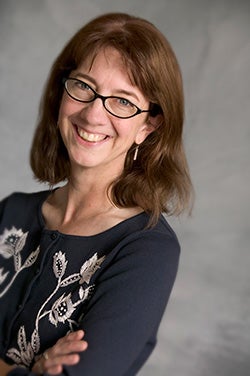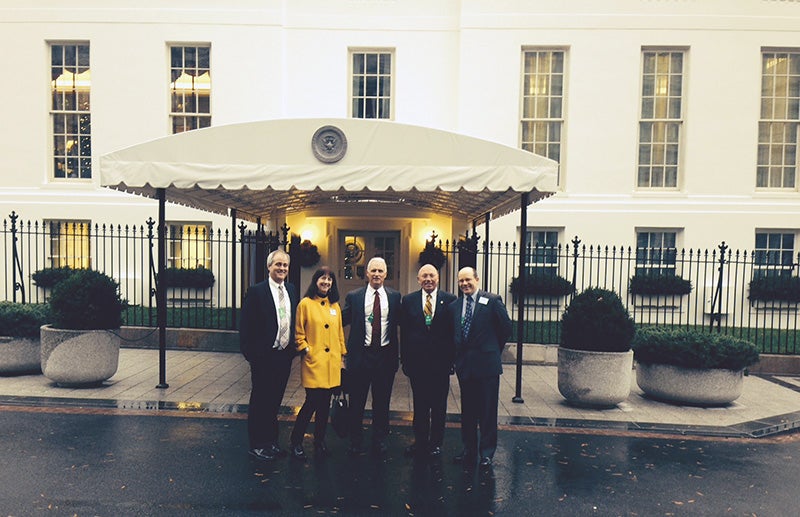Associate Professor Renee Irvin, director of the Master of Nonprofit Management Program at UO, was invited recently by the White House to gather with the nation’s top 100 civic participation leaders to celebrate the 100th anniversary of the community foundation.
 The “White House Convening on Community Foundations: Vital Leadership for America’s Future” showcased the ongoing and future work of community foundations across the United States and highlighted potential areas for collaboration and focus.
The “White House Convening on Community Foundations: Vital Leadership for America’s Future” showcased the ongoing and future work of community foundations across the United States and highlighted potential areas for collaboration and focus.
The invitation-only event celebrated the extraordinary contributions that community foundations have made across the nation.
“Our country stands strong because as Americans, we take responsibility for ourselves and for one another, creating a brighter, more hopeful tomorrow for all,” President Barack Obama said in a statement presented to the gathering. “[Community foundations] remain powerful examples of innovation at its very best.”
The historic celebration of the centennial impact of community foundations included sessions on climate/resilience, racial equality, the Affordable Care Act, disaster relief, rural economy, early education, and impact investing, to name a few. Facilitated by key Administration policy experts, the small-group conversations enabled in-depth discussion on specific topics among government officials, foundation executives, and thought leaders.
“I was happy to be there because my research, teaching, and volunteering are all tied to institutional grant making,” said Irvin, who is a volunteer member of the Oregon Community Foundation’s Southern Willamette Valley Leadership Council. “Community foundations are a terrific source of local inspiration to encourage people to give back in their communities. Community foundations, in fact, serve an ‘anchor mission’ in their communities, by encouraging people to step up and solve local issues,” Irvin says. “There is nothing trivial about local giving—programs that are tested and successful in one community can spread rapidly as other communities see that success and try their own versions of it.”
Irvin also was interviewed for WalletHub’s recent study examining 2014′s Most and Least Charitable States. In the interview, she noted that the biggest challenge facing charities is “building capacity and infrastructure strength when donors and grant makers don't want to fund administrative expenses.” Read the entire interview on WalletHub.
In addition, Irvin is quoted in the October Consumer Reports magazine on cause marketing.
Irvin fulfilled several roles while at the gathering in Washington. “At times I had my research hat on, listening carefully to tales from community foundation leaders, my professor hat on, explaining what programs we offer at University of Oregon, and my Oregon hat on, explaining to others what OCF does and noting good advice from other community foundations,” she said.
The first community foundation was created in 1914 when Frederick Goff created The Cleveland Foundation to facilitate charitable giving by residents to area organizations.
“Today, there are more than 700 in the U.S. convening cross-sector stakeholders on issues of community importance and driving billions in contributions to a wide range of important nonprofit causes,” stated Jonathan Greenblatt, special assistant to the President and the director of the Office of Social Innovation and Civic Participation, on a website about the event.
Community foundations tackle a wide range of “systemic challenges,” Greenblatt continued, “like long-term unemployment, responding to crises like natural disasters, and creating strong, collaborative relationships between local law enforcement and the communities they protect. … Community foundations typically are among the first to step forward when called on to serve, and the last to leave a situation until the job is completed.
“Their selfless giving across boundaries of ethnicity, faith, and political background exemplifies the vibrant pluralism of American society” Greenblatt noted, “strengthening our bonds of community and making our collective whole much greater than the sum of our individual parts.”

Above: Irvin is joined at the gathering in Washington by fellow academicians (from left) Matthew Hale (Seton Hall University), Robert Ashcraft (Arizona State University), Eugene Temple (Indiana University), and David Garvey (University of Connecticut). All five represent universities with strong curricular programs in philanthropy and nonprofit management.
